Keynote Speakers
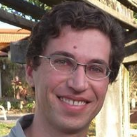
Silvio Jamil Ferzoli Guimarâes, Director of Posgraduation in Computer Science at PUC-Minas
http://www.icei.pucminas.br/research/viplab/
Exploring feature distribution to create mid-level representations: A case study in human action recognition
Silvio is the head of VIPLAB, a research laboratory hosted at and certified by PUC Minas (Belo Horizonte Campus, Brazil), and it has started its operation in 2004. The main project areas are: digital image, video and audio processing; multimedia indexing and retrieval; multimedia content analysis. Many projects have been conducted with cooperation of other institutions and/or labs, such as NPDI/DCC/UFMG, IC/UNICAMP, TEXMEX/IRISA and ESIEE/FRANCE. And, besides the projects developed with the participation of several graduate and undergraduate students, VIPLAB has also been involved in bilateral programs for international cooperation such as FAPEMIG-INRIA and CAPES-BRAFITEC.
Abstract: Mid-level representations are used to map sets of local features into one global representation for a given media descriptor. In visual pattern recognition tasks, Bag-of- Words (BoW) is one popular strategy, among many methods available in literature, due mainly by the simplicity in concept and implementation. Despite the overall good results achieved by BoW in many tasks, the method is unstable in high dimensional feature space and quantization errors are usually ignored in the final representation. To cope with these problems, we propose a new pooling function based on feature points distribution around codewords. We propose to use the standard deviation associated with each codeword to measure attribution discrepancy and weight the impact that feature points will assume in the final representation.
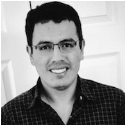 Marco Alvarez Vega, Assistant Professor of Computer Science at University of Rhode Island, USA
Marco Alvarez Vega, Assistant Professor of Computer Science at University of Rhode Island, USA
http://homepage.cs.uri.edu/~malvarez/
Machine Learning for Structured a Complex Data (to confirm )
Marco is an assistant professor in the Department of Computer Science and Statistics at the University of Rhode Island. He joined URI in 2015 after working in the Department of Computer and Information Sciences, University of Delaware as a visiting scholar. He graduated with a Ph.D. in CS from the Computer Science Department, Utah State University, a M.S. in CS from the Instituto de Ciências Matemáticas e de Computação, Universidade de São Paulo, and a B.S. in CS from Faculdade de Computação, Universidade Federal de Mato Groso do Sul.
 Juan C. Gutiérrez Cáceres, Head of the Computer Science Program, Universidad Nacional de San Agustín, Arequipa, Perú.
Juan C. Gutiérrez Cáceres, Head of the Computer Science Program, Universidad Nacional de San Agustín, Arequipa, Perú.
http://dina.concytec.gob.pe/appDirectorioCTI/VerDatosInvestigador.do?id_investigador=14249
Detección de acciones violentas en escenas de video
Doctor en Ciencias de la Computación por la Cátedra CONCYTEC de la Universidad Nacional de San Agustín (Perú). Master en Ciencias de la Computación y Matemática Computacional, realizado en el Instituto de Ciencias Matemáticas y de Computación (ICMC) de la Universidad de São Paulo (Brasil). Miembro fundador de la Sociedad Peruana de Computación (SPC) Perú. Actualmente desempeña el cargo de Director de Escuela Profesional de Ciencia de la Computación de la Universidad Nacional de San Agustín (Arequipa – Perú). Áreas de interés: Redes Complejas Reconocimiento de Patrones, Redes Neuronales, Sistemas dinámicos no lineales, Procesamiento de Imágenes.
Abstract. En la presente charla se presentan diferentes técnicas para la evaluación y detección de eventos en video de cámaras de vigilancia. Se presentan dos tipos de sistemas. Un sistema emplea el método de búsqueda de fuerza bruta para probar cada ubicación de espacio-tiempo en el video mediante un clasificador binario sobre si se produce un evento específico. El otro sistema aprovecha la detección y el seguimiento humano para evitar la costosa búsqueda de fuerza bruta y evalúa los cubos candidatos espacio-tiempo combinando redes neuronales convolucionales 3D (CNN) y clasificadores SVM basados en características locales de bolsa de palabras para detectar la presencia de eventos de intereses. Finalmente se presentan las diferentes aplicaciones en el área.
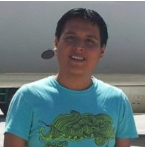 Junior Fabian Arteaga, Computer Vision Center, Universidad de Barcelona
Junior Fabian Arteaga, Computer Vision Center, Universidad de Barcelona
https://scholar.google.com/citations?user=xuMl0c4AAAAJ&hl=es
Cultural event recognition
Candidato a PhD en Ciencia de la Computación por la Universidad Autónoma de Barcelona – España. Magister en Ciencia de la Computación por la Universidad de Campinas – Brasil. Con experiencia en investigación en Computer Vision, Machine Learning, Reconocimiento de Patrones con énfasis en recuperación de imágenes y detección de objetos.
Abstract. Cultural events are kinds of typical events closely related to history and nationality, which play an important role in cultural heritage through generations. However, automatically recognizing cultural events still remains a great challenge since it depends on understanding of complex image contents such as people, objects, and scene context. Therefore, it is intuitive to associate this task with other high-level vision problems, e.g., object detection, recognition, and scene understanding. The Cultural Event Recognition challenge aims to investigate the performance of recognition methods based on several cues like garments, human poses, objects, background, etc. To this end, we built the first dataset based on cultural events from all around the globe, this dataset contains significant variability in terms of clothes, actions, illumination, localization and context. The Cultural Event Recognition dataset consists of images collected from two images search engines (Google Images and Bing Images). To build the dataset, we chose 99 important cultural events in the world and we created several queries with the names of these events. In order to have a more challenging competition we aggregated a new class called non-class, this class represents a distractor class and is composed by 2,000 images containing no information related to cultural events. To build this non-class, we randomly downloaded images from ImageNet and then we filtered each of the images. In the end, our dataset is composed of 28,705 images. This work summarizes the cultural event recognition challenge, showing our results as well as some of the main results achieved by the participants of the competitions CVPR 2015 and ICCV 2015 workshops.
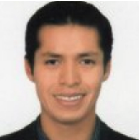 Ricardo Gonzalez Valenzuela, Master in Computer Science by University of Campinas, UNICAMP, Brazil.
Ricardo Gonzalez Valenzuela, Master in Computer Science by University of Campinas, UNICAMP, Brazil.
https://www.linkedin.com/in/gonzalez-valenzuela-ricardo-eugenio-02a70a67/
Machine Learning para el desarrollo de aplicaciones móviles
Over the last years, I have been researching of Image Processing and Machine Learning. The broad range of areas to develop Computer Vision algorithms, and others of similar nature, makes me get deeper in this knowledge, in the search of new solutions. I am really interested on research associations with enterprises focusing on challenge machine learning and image processing domain problems.
Abstract. El Machine Learning representa una nueva era en el desarrollo de software donde las computadoras, los dispositivos y otros equipos no requieren programación especial para completar las tareas. En cambio, pueden recopilar y analizar información que es necesaria para sacar conclusiones apropiadas y aprender durante el desempeño del programa. Ahora las máquinas pueden acumular experiencia previa para tomar decisiones tal como ocurre entre los seres humanos. Por supuesto, el proceso de aprendizaje requiere algoritmos especiales que “enseñen” a las máquinas. En esta charla se otorgarán algunas estrategias para el desarrollo de aplicaciones móviles y que lleven por dentro un componente inteligente basado en Machine Learning.
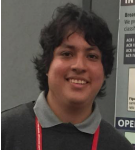 Pablo Fonseca Arroyo, Master in Computer Science by University of Campinas, UNICAMP, Brazil
Pablo Fonseca Arroyo, Master in Computer Science by University of Campinas, UNICAMP, Brazil
https://scholar.google.com.br/citations?user=CwP5cZcAAAAJ&hl=en
Triage automático de bugs de batería en smartphones usando Machine Learning
Realizó la maestría de Ciencias de la Computación en la Universidad de Campinas (UNICAMP) en Brasil. Su tema de investigación principal es Machine Learning, especialmente: Metric learning, Deep Learning y Text Mining. Antes de comenzar el postgrado, trabajó por 3 años en la Pontificia Universidad Católica del Perú desarrollando Legión Framework, un software open source para cómputo distribuido que fue el primer software registrado por la PUCP en INDECOPI.
Abstract.El alto nivel de competencia en el mercado de los smartphones obliga a que los ciclos prototipo-producto final sean acortados. Sin embargo, la experiencia del usuario puede verse seriamente degradada si bugs llegarán a los consumidores finales. En esta presentación discutiremos un sistema en línea de detección de bugs de batería para smartphones Android usando un stack de Gradient Boosting Machines. El proyecto fue desarrollado por un equipo de la Universidad Estadual de Campinas (UNICAMP) y financiado por Motorola Brasil.
